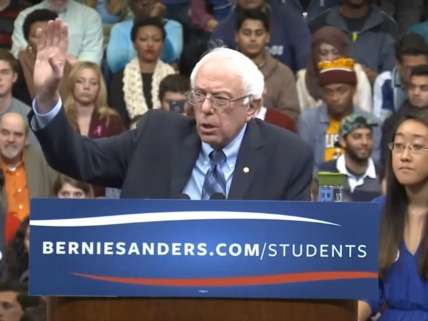Where Bernie Sanders Differs With Republicans on Marijuana
Repealing the national ban is a logical implication of federalism.

While campaigning in Nevada yesterday, Donald Trump confirmed that he thinks states should be free to legalize marijuana, although he has expressed doubts about the wisdom of that policy. "In terms of marijuana and legalization," he said, "I think that should be a state issue, state by state." That formulation is a bit clearer than what Trump said at the Conservative Political Action Conference last February: "If they vote for it, they vote for it." As I noted on Tuesday, most of the remaining Republican presidential candidates take a similar position.
On the face of it, saying the federal government should not interfere with legalization is not as bold as calling for the repeal of the national ban on marijuana, as Democratic presidential contender Bernie Sanders did this week. But a federalist approach to marijuana, which is what most of the Republican candidates have endorsed, should amount to the same thing. "The time is long overdue for us to remove the federal prohibition on marijuana," Sanders said during his appearance at George Mason University on Wednesday. "States should have the right to regulate marijuana the same way that state and local laws now govern the sale of alcohol and tobacco….It is time for the federal government to allow states to go forward as they best choose."
That is the federalist position, and Sanders correctly concludes that it requires removing marijuana from the list of congressionally prohibited substances. Mere prosecutorial forbearance, which is what the Obama administration has offered so far, is no substitute for a statutory change because it can be reversed at any moment by this adminstration or the next, exposing state-licensed marijuana businesses to the risk of raids, felony charges, prison, and property forfeiture. Furthermore, as long as marijuana remains a Schedule I drug, those businesses, which still qualify as criminal enterprises under federal law, will be unable to use the banking system or deduct business expenses on their tax returns.
If Republicans mean what they say about state autonomy, they should have no problem endorsing something like the Respect State Marijuana Laws Act. That bill, introduced by Rep. Dana Rohrabacher (R-Calif.) last April, would make the federal ban on marijuana inapplicable in states that decide to legalize the drug. That's what it means to let states make their own decisions in this area.
One way Sanders clearly has gone further than any of the other presidential candidates is by saying he favors legalizing marijuana, and not just that states should be able to do it. At the Democratic presidential debate in Las Vegas on October 13, Sanders said that if he lived in Nevada he would vote for the legalization initiative that will appear on that state's ballot next year. In explaining why, he misleadingly implied that people commonly go to prison for smoking pot. On Wednesday he clarified that point:
In 2014…there were 620,000 arrests for marijuana possession. That is one arrest every minute. According to a report by the American Civil Liberties Union, there were more than 8 million marijuana arrests in the United States from 2001 to 2010. Almost nine in 10 of those arrests were for possession. Arrests for marijuana possession rose last year nationwide even as Colorado, Washington, Oregon, Alaska, and the District of Columbia became the first states to legalize personal use of marijuana….
As is the case in many other areas, there is a racial component to this situation. Although about the same proportion of blacks and whites use marijuana, a black person is almost four times more likely to be arrested for marijuana possession than a white person. Too many Americans have seen their lives destroyed because they have criminal records as a result of marijuana use. That is wrong. That has got to change….
A criminal record could mean not only time in jail…A criminal record makes it harder for a person to get a job, harder for a person to get public benefits, harder for a person to even get housing. A criminal record stays with a person for his or her entire life. It is a serious business.
Sanders is right: It is no small thing to be treated as a criminal, even if you do not end up spending much time behind bars. A pot bust can have lifelong ramifications. A policy that imposes such burdens on people who have violated no one's rights is obviously unjust. Among the Republican candidates, only Rand Paul has made that point, although he still shies away from forthrightly endorsing legalization.


Show Comments (44)